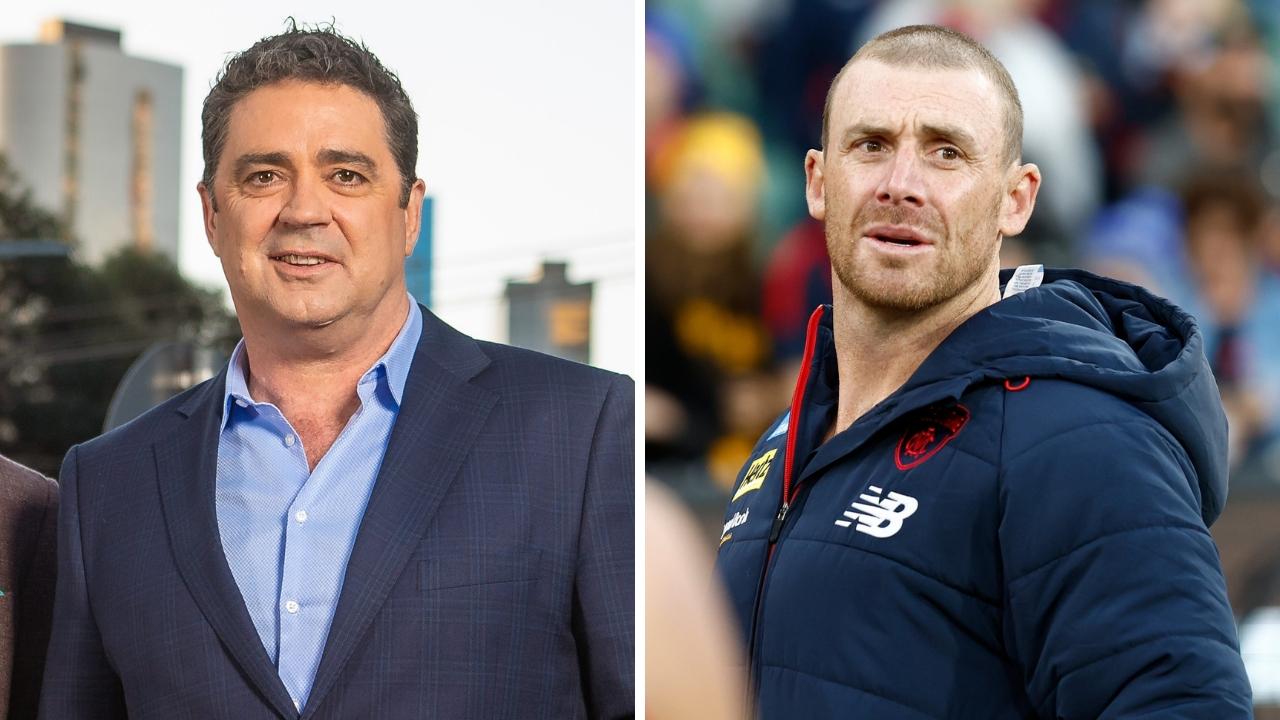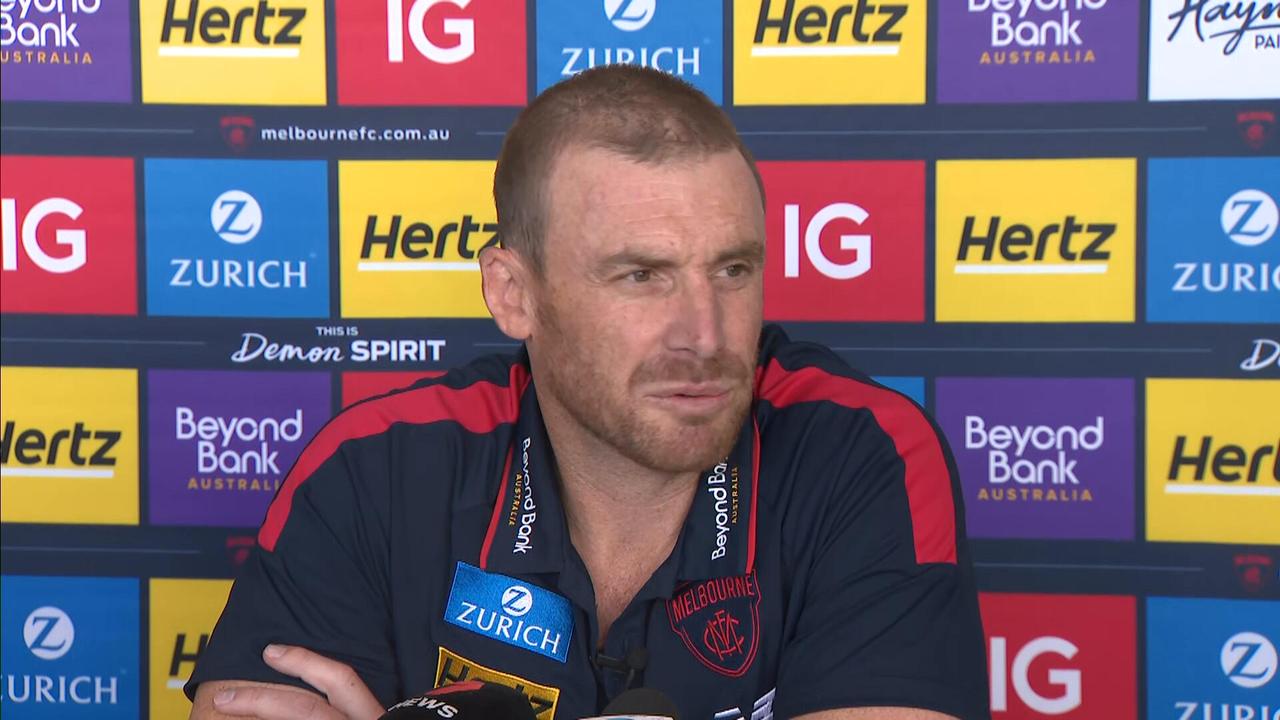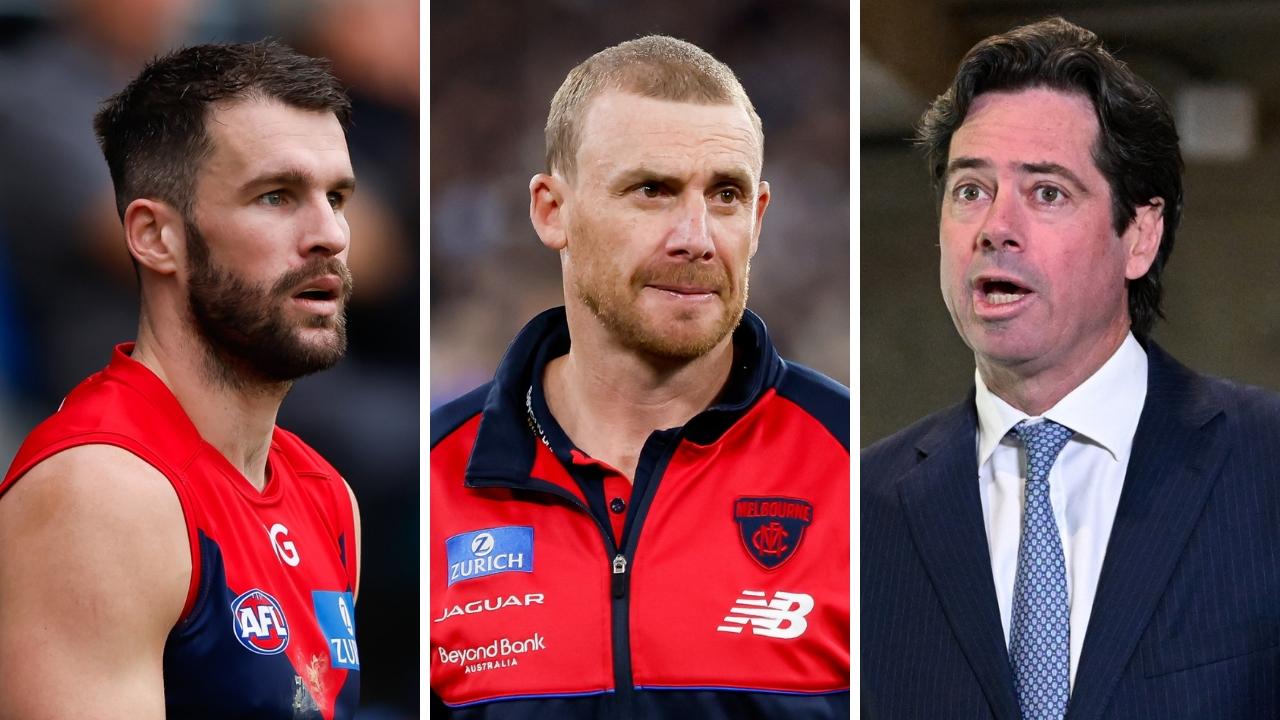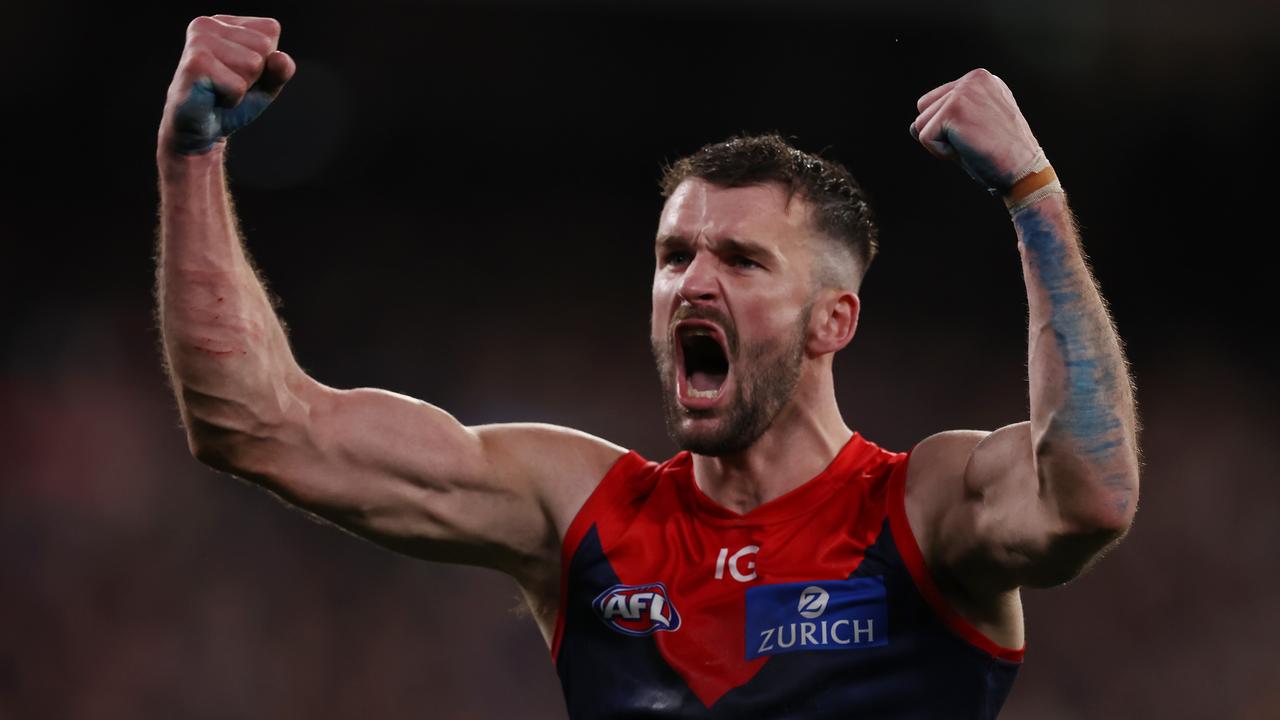AFL cocaine bombshell twist ‘beggars belief’ as Demons respond
The AFL has responded to bombshell claims of a cocaine cover up operation with a confession that has been torn to shreds by footy legends.

AFL
Don't miss out on the headlines from AFL. Followed categories will be added to My News.
Football legends, including Demons great Garry Lyon, have called out the AFL after revelations the league’s medical policy unapologetically covers up cases where players are found to have taken illicit substances.
The league is in crisis after bombshell claims were made by Federal MP Andrew Wilkie that senior AFL executives made efforts to help cover up Demons coach Simon Goodwin’s alleged cocaine use.
Mr Wilkie told parliament he had received a signed statement from former Melbourne doctor Zeeshan Arain in which he accused the AFL of facilitating clandestine drug tests at Dorevitch Pathology in Heidelberg, a northern Melbourne suburb.
The scandal took a huge twist on Wednesday with the AFL confirming it was fully aware of the secret testing operation and in fact designed the system to stop players from potentially testing positive for a banned substance when tested by Sport Integrity Australia agents.
The league broke its silence in a lengthy statement on Wednesday morning.
That statement came after Goodwin fronted the press and said he had no line of sight in regards to claims made about players being told to “fake injuries” in order to be withdrawn from matches in cases where they could potentially test positive for a performance enhancing substances on game day.
The league has said its medical policy does include “off the books” testing for illicit drug use.
The footy world on Wednesday reacted with concerns about the policy — and the lack of transparency surrounding cases where players are potentially late scratchings from matches and positive tests are kept hidden.
The league, however, is standing by its operational procedures.
“Urine tests conducted by doctors to determine if a player has used illicit substances are part of the AFL’s Illicit Drug Policy medical model and have been for some time,” the AFL statement claimed, surrounding the policy that was introduced in 2005.
“Doctors may use those urine tests to obtain an immediate result to determine whether any illicit substance remains in a player’s system. This is normally conducted at the club or in the doctors consulting rooms.

“If the test shows a substance is still in the player’s system, a doctor will take steps to prevent a player from taking part in either training and/or an AFL match both for their own health and welfare and because having illicit substances in your system on match day may be deemed performance enhancing and a breach of the Australian Football Anti-Doping Code (depending on the substance involved).
“It is absolutely imperative that no doctor or club official should ever allow or encourage a player to take the field knowing they have recently taken an illicit substance that may be harmful to their health and/or may be deemed performance-enhancing (as many illicit substances are on match day).”
The AFL said the monitoring of players is “highly confidential”.
“A doctor or healthcare professional generally cannot disclose the nature of the clinical intervention or condition to others unless the player willingly consents,” the statement read.
“We understand that the Illicit Drugs Policy can be improved and we are working with the AFLPA and players to improve the policy and the system to ensure we are better able to change the behaviours of players.
“But we are unapologetic about club and AFL doctors taking the correct steps to ensure that any player who they believe has an illicit substance in their system does not take part in any AFL match and that doctor patient confidentially is upheld and respected.”
The fact that fans are kept in the dark was met with scorn by sections of the footy community on Wednesday. The fact that the policy opens the door for fans to make assumptions about future cases where players are withdrawn from matches has also been condemned.
AFL Hall of Fame coach Mick Malthouse said he was struggling to accept some of the details of Mr Wilkie’s claims.
“It’s quite damning, it’s such a surprise. I can’t believe how angry I’ve got just hearing the news,” Malthouse said on The Today Show.
“We have an obligation for the players’ health, to start off; we have an obligation to the game, want a fair, honest game, we want players who run down the race to play good football without compromise.
“This is almost on the same level as the Essendon saga — in fact it might even go beyond that. This is suggesting that AFL officials are involved in this.
“It is just so damning... it’s going to place every player, every club official, and in particular club doctors now under scrutiny.
“I can’t describe how angry I am about this... I’ve been in football for 50 years, and you think how can this possibly be?”
Melbourne Demons legend Garry Lyon also said Mr Wilkie’s claims, made under parliamentary privilege, would result in further criticism towards the league’s controversial three-strikes policy.

“That beggars belief, but everyone has said the same thing in footy for the best part of 18 years,” he said on SEN Breakfast.
“How can you have a three strike drug system that’s caught one person?”
He went on to say: “The suspicion is that anyone who is a late withdrawal… the average fan is going to say, ‘Oh late withdrawal, what’s going on here?’”
Fox Footy commentator Gerrard Whateley also criticised the policy on Wednesday morning.
“The idea that there is no consequence for drug use in a football sense isn’t true… players do miss games… but there’s no transparency around it,” Whateley told SEN.
“The illicit drugs policy has always been shrouded in secrecy. And the tension piece between player welfare, privileged medical information and brand protection has been a constant debate since it was first introduced.
“It has never won public approval or confidence. But the AFL and players have always been unrepentant about that – sighting a voluntary code with welfare as the principal consideration.
“We went through the phase of learning about self-reporting – which seemed like a loophole before a player would get caught.
“Now a second testing regime has been revealed. The AFL will need to explain to Federal Parliament why this isn’t as clandestine as Andrew Wilkie made it appear.
“Sports Integrity Australia only tests for illicit substances on game day… where cocaine and the like are considered performance enhancing.
“This AFL system appears built to ensure no player with an illicit substance in their system takes the field, thus the integrity of the game isn’t compromised by a performance enhancing substance.
“And a player isn’t left exposed to the four-year ban under the WADA code. The cup test sees to that.

“Until today it looked like only the likes of Bailey Smith and Jack Ginnivan felt the consequences of the illicit drug code.
“If you’re caught cold and you embarrass the brand you get a two-game ban.
“But if you had an illicit substance in your system in the lead up to a game you were banned from playing. And it was called a hamstring.
“The AFL will need to fully explain why this is appropriate and necessary and why it isn’t as clandestine as it was made to sound in Parliament last night.”
Port Adelaide president David Koch said he was shocked.
“I am absolutely stunned by it,” David Koch said on FiveAA
“I’m reticent to comment because I only know what we’ve all read in the paper and the allegations.
“Obviously the AFL will be investigating it closely. To have a deliberate route to avoid testing seems beyond belief to me.
“If you’re a serious participant signing up to the WADA procedures you would think every ‘I’ would be dotted and every ‘T’ crossed to do the right thing. So I’m as shocked as anyone.”
Sydney Swans chief executive Tom Harley also said he was aware of the testing as per the AFL’s medical policy but had “never seen” doctors lie about players’ injuries.
Goodwin said he was “surprised” to hear accusations that the AFL was involved in a “multi-hundred-million-dollar fraud” in parliament on Tuesday night.
Using parliamentary privilege, Wilkie alleged the drug testing operation was designed to stop players from testing positive for cocaine amid claims drug use was rife across the AFL.
Melbourne swingman Joel Smith is serving a provisional suspension after he failed a drug tests on match day after the Demons’ round 23 win over Hawthorn on August 20, 2023.
Responding to the claims on Wednesday morning, Goodwin said he and all clubs would be “interested” in finding out more information from the AFL and the AFL Players Association, with reports that the league didn’t deny the secret tests happened.

“Every club would want answers and how the policy works and is it a success?” he said.
“We’ve been through a bit, but this is an AFL policy and we will be asking the appropriate questions.
“This policy is an AFL policy, it’s an AFLPA policy and its led through a medical model. It’s something I have never really thought about. I back in the process and what the policy is.
“I understand the policy but I don’t get information that people would expect to get.
“I get information that I am required, and the policy says it’s information that should remain confidential. It’s not unexpected I don’t have information, that’s the way the policy is designed.
“This is a process that the AFL and the AFLPA and the club doctors put together from a confidentiality perspective.
“I have enormous trust in our doctor to be able to do their job. I am not going to question how they go about their job.
“I’m sure it’s something the AFL will give good clarity on, and we’ll all move forward.”
Goodwin said he had no thoughts about the ex-Melbourne doctor who was central to the claims.
“This is an AFL-wide thing … we need to get to the bottom of it and we can have some more information going forward,” he said.
Calls are growing louder for the AFL to review its strikes policy for drug use.
“The illicit drugs policy in the AFL, we are absolutely all aware that it’s a medical model. We put enormous trust and faith into our medical practitioners and our doctors,” Harley said.
“I can only comment on what I’ve seen and the clubs that I’ve been involved in, and I’ve never seen that (doctors lying about players’ injuries).
“There’s no doubt that what’s been reported is having some cut through this morning. As a representative of the club, I’m sure there’ll be more information passed through in the next 24-48 hours into what it really means.
“All I can say is that it’s not a practice or a behaviour that I’ve been privy to.”
In his address to the House of Representatives on Tuesday night, Wilkie said he had signed testimony from three whistleblowers and, using the protection of parliamentary privilege, also claimed.
• Drug abuse and illicit behaviour is prevalent across the AFL
• The Melbourne Football Club ran a secret operation of drug testing players at Dorevitch Pathology in Heidelberg (Melbourne’s north) in order to catch them from potentially testing positive when tested for doping violations by SIA agents
• Former AFL chief medical officer Peter Harcourt was aware of the operation
• There is evidence of wilful inaction by AFL chairman Richard Goyder and former chief executive Gillon McLachlan.
• The AFL’s illicit drug policy is a “systemic failure” to protect players.
Mr Wilkie finished his bombshell address by calling directly for Prime Minister Anthony Albanese to intervene.
“I call for intervention at the highest level and ask the Prime Minister to personally intervene in this matter, to study the documents in my possession and to do everything he can to restore and protect the reputation of our beloved game, because right now the term ‘white line fever’ has taken on a different and sinister meaning at the AFL,” Mr Wilkie said.
Goodwin in October strongly denied accusations he used illicit drugs.
Demons captain Max Gawn in February denied there is an illicit drug culture at the football club.
More Coverage
Originally published as AFL cocaine bombshell twist ‘beggars belief’ as Demons respond









